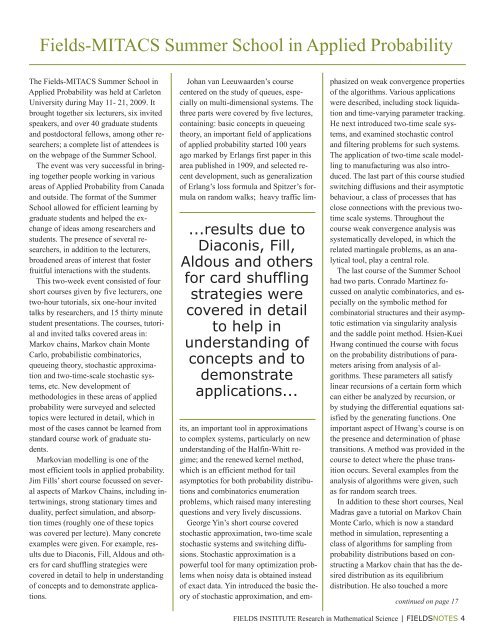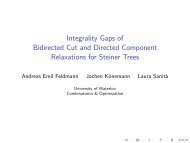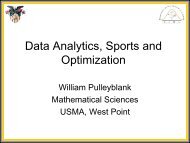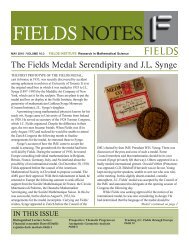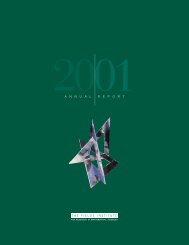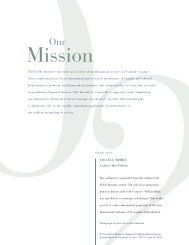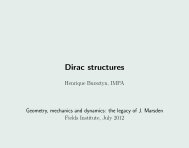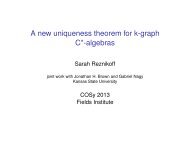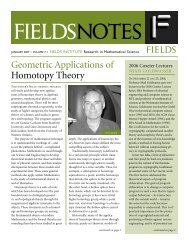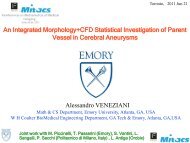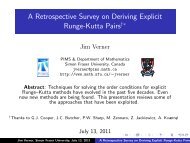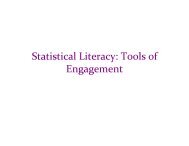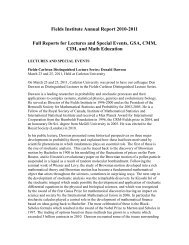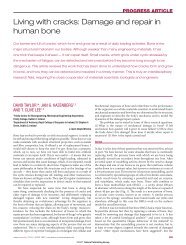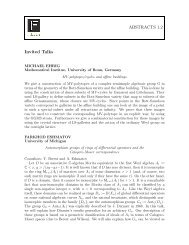Fields Notes, September 2009 - Fields Institute - University of Toronto
Fields Notes, September 2009 - Fields Institute - University of Toronto
Fields Notes, September 2009 - Fields Institute - University of Toronto
You also want an ePaper? Increase the reach of your titles
YUMPU automatically turns print PDFs into web optimized ePapers that Google loves.
<strong>Fields</strong>MITACS Summer School in Applied Probability<br />
The <strong>Fields</strong>MITACS Summer School in<br />
Applied Probability was held at Carleton<br />
<strong>University</strong> during May 11 21, <strong>2009</strong>. It<br />
brought together six lecturers, six invited<br />
speakers, and over 40 graduate students<br />
and postdoctoral fellows, among other researchers;<br />
a complete list <strong>of</strong> attendees is<br />
on the webpage <strong>of</strong> the Summer School.<br />
The event was very successful in bringing<br />
together people working in various<br />
areas <strong>of</strong> Applied Probability from Canada<br />
and outside. The format <strong>of</strong> the Summer<br />
School allowed for efficient learning by<br />
graduate students and helped the exchange<br />
<strong>of</strong> ideas among researchers and<br />
students. The presence <strong>of</strong> several researchers,<br />
in addition to the lecturers,<br />
broadened areas <strong>of</strong> interest that foster<br />
fruitful interactions with the students.<br />
This twoweek event consisted <strong>of</strong> four<br />
short courses given by five lecturers, one<br />
twohour tutorials, six onehour invited<br />
talks by researchers, and 15 thirty minute<br />
student presentations. The courses, tutorial<br />
and invited talks covered areas in:<br />
Markov chains, Markov chain Monte<br />
Carlo, probabilistic combinatorics,<br />
queueing theory, stochastic approximation<br />
and twotimescale stochastic systems,<br />
etc. New development <strong>of</strong><br />
methodologies in these areas <strong>of</strong> applied<br />
probability were surveyed and selected<br />
topics were lectured in detail, which in<br />
most <strong>of</strong> the cases cannot be learned from<br />
standard course work <strong>of</strong> graduate students.<br />
Markovian modelling is one <strong>of</strong> the<br />
most efficient tools in applied probability.<br />
Jim Fills’ short course focussed on several<br />
aspects <strong>of</strong> Markov Chains, including intertwinings,<br />
strong stationary times and<br />
duality, perfect simulation, and absorption<br />
times (roughly one <strong>of</strong> these topics<br />
was covered per lecture). Many concrete<br />
examples were given. For example, results<br />
due to Diaconis, Fill, Aldous and others<br />
for card shuffling strategies were<br />
covered in detail to help in understanding<br />
<strong>of</strong> concepts and to demonstrate applications.<br />
Johan van Leeuwaarden’s course<br />
centered on the study <strong>of</strong> queues, especially<br />
on multidimensional systems. The<br />
three parts were covered by five lectures,<br />
containing: basic concepts in queueing<br />
theory, an important field <strong>of</strong> applications<br />
<strong>of</strong> applied probability started 100 years<br />
ago marked by Erlangs first paper in this<br />
area published in 1909, and selected recent<br />
development, such as generalization<br />
<strong>of</strong> Erlang’s loss formula and Spitzer’s formula<br />
on random walks; heavy traffic lim<br />
...results due to<br />
Diaconis, Fill,<br />
Aldous and others<br />
for card shuffling<br />
strategies were<br />
covered in detail<br />
to help in<br />
understanding <strong>of</strong><br />
concepts and to<br />
demonstrate<br />
applications...<br />
its, an important tool in approximations<br />
to complex systems, particularly on new<br />
understanding <strong>of</strong> the HalfinWhitt regime;<br />
and the renewed kernel method,<br />
which is an efficient method for tail<br />
asymptotics for both probability distributions<br />
and combinatorics enumeration<br />
problems, which raised many interesting<br />
questions and very lively discussions.<br />
George Yin’s short course covered<br />
stochastic approximation, twotime scale<br />
stochastic systems and switching diffusions.<br />
Stochastic approximation is a<br />
powerful tool for many optimization problems<br />
when noisy data is obtained instead<br />
<strong>of</strong> exact data. Yin introduced the basic theory<br />
<strong>of</strong> stochastic approximation, and em<br />
phasized on weak convergence properties<br />
<strong>of</strong> the algorithms. Various applications<br />
were described, including stock liquidation<br />
and timevarying parameter tracking.<br />
He next introduced twotime scale systems,<br />
and examined stochastic control<br />
and filtering problems for such systems.<br />
The application <strong>of</strong> twotime scale modelling<br />
to manufacturing was also introduced.<br />
The last part <strong>of</strong> this course studied<br />
switching diffusions and their asymptotic<br />
behaviour, a class <strong>of</strong> processes that has<br />
close connections with the previous twotime<br />
scale systems. Throughout the<br />
course weak convergence analysis was<br />
systematically developed, in which the<br />
related martingale problems, as an analytical<br />
tool, play a central role.<br />
The last course <strong>of</strong> the Summer School<br />
had two parts. Conrado Martinez focussed<br />
on analytic combinatorics, and especially<br />
on the symbolic method for<br />
combinatorial structures and their asymptotic<br />
estimation via singularity analysis<br />
and the saddle point method. HsienKuei<br />
Hwang continued the course with focus<br />
on the probability distributions <strong>of</strong> parameters<br />
arising from analysis <strong>of</strong> algorithms.<br />
These parameters all satisfy<br />
linear recursions <strong>of</strong> a certain form which<br />
can either be analyzed by recursion, or<br />
by studying the differential equations satisfied<br />
by the generating functions. One<br />
important aspect <strong>of</strong> Hwang’s course is on<br />
the presence and determination <strong>of</strong> phase<br />
transitions. A method was provided in the<br />
course to detect where the phase transition<br />
occurs. Several examples from the<br />
analysis <strong>of</strong> algorithms were given, such<br />
as for random search trees.<br />
In addition to these short courses, Neal<br />
Madras gave a tutorial on Markov Chain<br />
Monte Carlo, which is now a standard<br />
method in simulation, representing a<br />
class <strong>of</strong> algorithms for sampling from<br />
probability distributions based on constructing<br />
a Markov chain that has the desired<br />
distribution as its equilibrium<br />
distribution. He also touched a more<br />
continued on page 17<br />
FIELDS INSTITUTE Research in Mathematical Science | FIELDSNOTES 4


